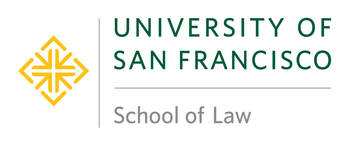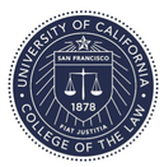Water Law Primer
Water Law 101
Water Law 101
Organized by USF School of Law
Open the day with an introductory lesson on water law with Richard Roos-Collins, a water law expert and Adjunct Professor at the University of San Francisco School of Law. Professor Roos-Collins is a principal of Water and Power Law Group PC and General Counsel to the Hydropower Reform Coalition (Washington, D.C.), representing more than 2 million people interested in balancing power and environmental benefits. His practical expertise and experience teaching Water Law at USF School of Law make this session a great opportunity, whether you are new to water law or not.
This primer is designed to benefit students and new water law practitioners alike. Professor Roos-Collins will provide an overview of the laws governing water resources and help frame the panels so that all attendees are better able to understand and participate in the discussions. MCLE credit is available for purchase.
Open the day with an introductory lesson on water law with Richard Roos-Collins, a water law expert and Adjunct Professor at the University of San Francisco School of Law. Professor Roos-Collins is a principal of Water and Power Law Group PC and General Counsel to the Hydropower Reform Coalition (Washington, D.C.), representing more than 2 million people interested in balancing power and environmental benefits. His practical expertise and experience teaching Water Law at USF School of Law make this session a great opportunity, whether you are new to water law or not.
This primer is designed to benefit students and new water law practitioners alike. Professor Roos-Collins will provide an overview of the laws governing water resources and help frame the panels so that all attendees are better able to understand and participate in the discussions. MCLE credit is available for purchase.
|
MCLE Materials
|
Panel 1
Klamath Dam Removal: Stakeholders, Science, and Sustainability
Organized by UC Law SF & Stanford Law School
Dive into the complexities of the Klamath Dam removal with our panel as they navigate the intricate web of stakeholders shaping this environmental initiative, from tribal communities to government agencies. This panel will delve into strategic procurement methods, risk management, and damages to third parties, providing valuable insights into the nuanced decision-making process. Gain a comprehensive understanding of the government water quality certification, preemption, and environmental review processes, crucial elements in navigating the regulatory framework essential to this transformative initiative. Throughout the discussion, spotlighting collaborative efforts between tribal interest, environmental advocates, and government bodies will underscore the pivotal roles each plays in advancing this environmental initiative.
Dive into the complexities of the Klamath Dam removal with our panel as they navigate the intricate web of stakeholders shaping this environmental initiative, from tribal communities to government agencies. This panel will delve into strategic procurement methods, risk management, and damages to third parties, providing valuable insights into the nuanced decision-making process. Gain a comprehensive understanding of the government water quality certification, preemption, and environmental review processes, crucial elements in navigating the regulatory framework essential to this transformative initiative. Throughout the discussion, spotlighting collaborative efforts between tribal interest, environmental advocates, and government bodies will underscore the pivotal roles each plays in advancing this environmental initiative.
|
Panel 2
Water Rights Enforcement in California
Organized by University of the Pacific, McGeorge School of Law
This panel will explore the role of robust water rights enforcement to effective water governance in California. The panel will explore the history of enforcement, the current enforcement framework, and contemporary issues in enforcement. The panel will also review recently enacted legislation related to enforcement, such as Senate Bill 389 (Allen) and consider potential future reforms, exploring the potential benefits and challenges of amending enforcement standards from the perspectives of the state, environmental representatives, and water rights holders.
This panel will explore the role of robust water rights enforcement to effective water governance in California. The panel will explore the history of enforcement, the current enforcement framework, and contemporary issues in enforcement. The panel will also review recently enacted legislation related to enforcement, such as Senate Bill 389 (Allen) and consider potential future reforms, exploring the potential benefits and challenges of amending enforcement standards from the perspectives of the state, environmental representatives, and water rights holders.
|
Special Session
Racial Equity Discussion
Racial Equity Discussion
Organized by USF School of Law
Join us for an enlightening and interactive Racial Equity Discussion that delves into the importance of diversity and inclusion to the water law bar. Moderators will share their experiences on their career paths in the field of water law and how imperative it is for water governance to reflect the rich diversity of California. This session will present attendees with an opportunity to think about and discuss how practitioners and employers can help promote racial equity and diversity in their organizations, mentorships, and the water law bar.
Join us for an enlightening and interactive Racial Equity Discussion that delves into the importance of diversity and inclusion to the water law bar. Moderators will share their experiences on their career paths in the field of water law and how imperative it is for water governance to reflect the rich diversity of California. This session will present attendees with an opportunity to think about and discuss how practitioners and employers can help promote racial equity and diversity in their organizations, mentorships, and the water law bar.
|
Panel 3
Water Rights: Clarifying the 2023 Water Board Arrowhead Spring Order
Organized by Golden Gate University School of Law and UC Berkeley School of Law
The State Water Resources Control Board ordered BlueTriton Brands to cease and desist diverting millions of gallons of water for its bottling operations from the Strawberry Creek watershed in San Bernardino mountains. The Board determined that BlueTriton lacks any valid rights to divert water for bottling at 10 of its 13 diversion points in the watershed. BlueTriton responded by filing a lawsuit claiming the Board does not have the regulatory authority to regulate the water at issue. This panel will examine disputes regarding the scope of the Board’s regulatory authority, evidentiary issues associated with water rights claims, the development of a legal framework for defining and determining the connectivity of groundwater, springwater, and surface water, and the order’s future implications for water rights administration and enforcement.
The State Water Resources Control Board ordered BlueTriton Brands to cease and desist diverting millions of gallons of water for its bottling operations from the Strawberry Creek watershed in San Bernardino mountains. The Board determined that BlueTriton lacks any valid rights to divert water for bottling at 10 of its 13 diversion points in the watershed. BlueTriton responded by filing a lawsuit claiming the Board does not have the regulatory authority to regulate the water at issue. This panel will examine disputes regarding the scope of the Board’s regulatory authority, evidentiary issues associated with water rights claims, the development of a legal framework for defining and determining the connectivity of groundwater, springwater, and surface water, and the order’s future implications for water rights administration and enforcement.
|
Panel 4
SGMA: A Decade in Review
Organized by UC Davis School of Law
Groundwater has always been a significant source of water in California. However, groundwater pumping was largely unregulated until the passage of the Sustainable Groundwater Management Act (SGMA) in 2014. Over the last ten years, SGMA implementation has created a new infrastructure for groundwater management through the formation of Groundwater Sustainability Agencies (GSAs) and development of Groundwater Sustainable Plans (GSPs). GSAs & GSPs have varied in scope, content, ambition, and compliance. This panel will identify and discuss how implementation has succeeded and where SGMA can improve going forward.
Groundwater has always been a significant source of water in California. However, groundwater pumping was largely unregulated until the passage of the Sustainable Groundwater Management Act (SGMA) in 2014. Over the last ten years, SGMA implementation has created a new infrastructure for groundwater management through the formation of Groundwater Sustainability Agencies (GSAs) and development of Groundwater Sustainable Plans (GSPs). GSAs & GSPs have varied in scope, content, ambition, and compliance. This panel will identify and discuss how implementation has succeeded and where SGMA can improve going forward.
|
MCLE credit hours are provided by University of San Francisco School of Law
(Provider Number 2600)
(Provider Number 2600)


















